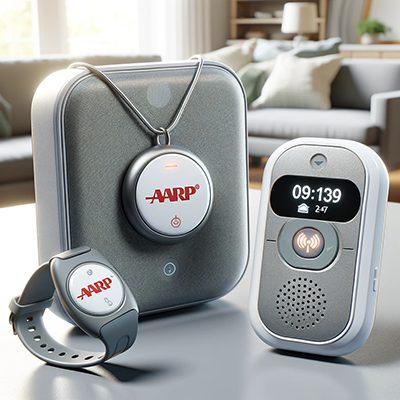Contents
- 1 Fall Detection Technology
- 2 What You Need to Know About AARP Medical Alert Systems
- 3 Choosing the Right AARP Medical Alert Systems
- 4 The Limitations of AARP Medical Alert Systems
- 4.1 AARP Member Medical Alert Discounts and Recommended Systems
- 4.2 Checking In with Your Loved One: Monitoring Options for Medical Alert Systems
- 4.3 Area Agencies on Aging and Medical Alert Systems
- 4.4 Activation and Emergency Services
AARP Medical Alert Systems help seniors feel secure and independent. These systems have fantastic capabilities, including two-way communication, GPS tracking, and fall detection. Seniors frequently choose these medical alert devices because they are simple to set up. The products are offered in various formats, such as wearable technology, home-based systems, and mobile apps.
Seniors who use AARP Medical Alert Systems can be monitored around the clock to ensure they get help immediately in an emergency. AARP Medical Alert Systems range in price according to the system type and level of service needed. We only desire what is best for our senior family members. This is where AARP Medical Alert Systems come into play, giving seniors and their families peace of mind.
Fall Detection Technology
Technology that can detect falls even when seniors cannot activate the warning button themselves is a nice feature. This ensures that assistance is sent out without any delay. Additionally, GPS tracking makes it possible to pinpoint a person’s location, enabling emergency personnel to arrive on the scene quickly in an emergency.

Due to the numerous alternatives, these systems appeal to a multitude of lifestyles. Wearable gadgets like bracelets or pendants offer constant security wherever people prefer to be on the move. Mobile apps enable remote access from anywhere at any time. At the same time, home-based systems provide coverage only inside the walls of the user’s residence.
Another advantage of these systems is their ease of use; you plug them in or put them on to get started. These gadgets don’t require elaborate instructions or technological knowledge.
Knowing that AARP Medical Alert Systems offers 24/7 monitoring services ensures that assistance is always just a button push away in an emergency. With this extra layer of security, senior citizens might feel more self-assured and independent in their daily lives.
Like any other service, AARP Medical Alert Systems’ price varies according to the required degree of coverage. However, it’s crucial to remember that investing in the security of your loved ones is invaluable.
What You Need to Know About AARP Medical Alert Systems
These gadgets, which can be activated in an emergency, come in pendants or wristbands. Some models additionally have fall detection technology, which, if the wearer falls and cannot click the button, can automatically send out an alert. These gadgets are made to enable senior citizens to live freely while being aware that assistance is only a button press away.
They can accommodate people with limited mobility or those who live alone. With round-the-clock monitoring services, qualified specialists are constantly on hand to respond to alarms and, if necessary, deploy emergency assistance.
Choosing the Right AARP Medical Alert Systems
Finding the medical alert system that best suits your needs and budget requires investigating and comparing available options. Numerous providers exist, each with different features and price ranges.
Beyond the fundamental emergency response capabilities, specific AARP medical alert systems include extra functions. For instance, some plans offer GPS tracking or medicine reminders. Others might provide two-way communication features that let users communicate with the personnel working at the monitoring center.
These aspects should be considered when selecting an alert system. You should pick a service provider that provides the things you require at a cost you can afford. Before making a choice, studying customer reviews is also a good idea.
The Limitations of AARP Medical Alert Systems
It’s crucial to remember that AARP medical alert systems are not a replacement for routine medical care or emergency services, even though they can be an invaluable help for older adults who live alone or have restricted mobility. Users must always dial 911 in the event of a significant medical emergency.
Fall detection equipment is also imperfect and might not precisely detect all falls. Users should still consider using mobility aids when required and wearing the proper footwear.
AARP Member Medical Alert Discounts and Recommended Systems
Medical alert systems are discounted exclusively for AARP members. The current discount given to members differs based on the supplier because different companies provide these discounts.
Philips Lifeline, Medical Guardian, and Bay Alarm Medical are a few of the medical alert systems suggested for AARP members.
- Philips Lifeline
One of the most well-liked medical alert systems today is Philips Lifeline. It provides various features to accommodate various demands and lifestyles. For individuals who spend most of their time at home, its HomeSafe Standard system is excellent. In contrast, its GoSafe 2 system is ideal for those constantly on the go. Both devices have built-in fall detection technology.
- Medical Guardian
Another well-regarded provider of medical alert systems is Medical Guardian, which offers various solutions to meet various demands. Its Classic Guardian system is excellent for people who spend most of their time at home. In contrast, its Mobile Guardian system is ideal for people constantly on the go. These devices provide GPS tracking features that enable emergency personnel to find you quickly.
- Bay Alarm Medical
Various medical alert systems are available from Bay Alarm Medical to suit different demands and lifestyles. Its On-The-Go System is suitable for people constantly on the go, while its In-Home System is perfect for people who spend most of their time at home. Both of these systems have GPS tracking and fall detection technologies.
AARP membership is necessary to take advantage of the discounts these providers provide. Medical alert system standard prices usually offer discounts between 10% and 25%. AARP members should ask their selected provider for the most recent details on potential discounts.
Checking In with Your Loved One: Monitoring Options for Medical Alert Systems

Fall Detection Devices: Automatic Alerts for Emergencies
Devices for detecting falls are an essential part of medical alert systems. Even if the user cannot hit the warning button, these gadgets use sensors to determine when a person has fallen and automatically send an alert to the monitoring center. Senior citizens with mobility limitations or who live alone may find this particularly important. Falls are one of the most customary ways for older people to get hurt, and getting quick medical help can help avoid significant complications.
Monthly Monitoring Fees: Coverage for Emergency Services
Although fall detection devices are a crucial component of medical alert systems, they are only a tiny portion of a thorough monitoring service. The monthly monitoring costs cover the cost of having a live person on call around the clock to handle emergencies. This means consumers can connect with a qualified operator and summon emergency services or call predetermined emergency contacts by pressing their alert button during a health emergency.
GPS Tracking: Peace of Mind for Family Members
Many medical alert systems feature GPS tracking capabilities in addition to fall detection and emergency response services. This enables family members and emergency contacts to find their loved ones in an emergency. For instance, GPS tracking can assist in promptly locating a senior with dementia who wanders away from home and ensuring their safe return.
Regular Monitoring: Peace of Mind for Users and Loved Ones
Regular monitoring can give the user and their loved ones peace of mind. Knowing that assistance is always available in a medical emergency can reduce anxiety and worry brought on by age or a chronic condition. Regular check-ins from monitoring staff can also help spot potential health issues before they develop into more significant difficulties.
Area Agencies on Aging and Medical Alert Systems
Area Agencies on Aging: Helping Older Adults Find the Best Medical Alert Systems
Area Agencies on Aging (AAA) are nonprofit organizations that support older people in their state by offering resources and services. AAA can help seniors find medical alert system suppliers and services in a senior area in numerous ways. Medicare might cover medical alert systems for qualified beneficiaries, including those enrolled in Medicare Advantage plans.
Finding a Provider: How AAA Can Help
With a 24-hour response center, Medical Guardian is a well-known supplier of home medical alert systems. On the other hand, several different service providers and gadgets are on the market. As a result, older individuals may find it challenging to select the finest service for their requirements. Fortunately, AAA can offer information on various medical alert system vendors and products to assist senior citizens in making informed choices.
AAA has vast resources and knowledge of regional service providers. It can also help older people find local nonprofits providing extra support services like meal delivery or transportation. By collaborating closely with these groups, AAA may guarantee that senior citizens receive comprehensive care that satisfies their needs.
Activation and Emergency Services
Medical alert systems can be launched in an emergency to connect people with emergency services swiftly. This function is crucial for people living alone or with mobility problems, making it difficult to access a phone in an emergency immediately.
When selecting a medical alert system provider, response time, dependability, and convenience are crucial considerations. Some suppliers offer extra services applicable to some customers, such as fall detection or prescription reminders.
How Much Does an AARP Medical Alert System Cost?
Monthly Fee and Starting Price
The monthly cost is one of the most crucial aspects when selecting an AARP medical alert system. The equipment, monitoring services, and customer support are included in the $30 monthly starting price. However, this cost could change based on the particular features and accessories included in the package.
It’s crucial to remember that specific AARP medical alert systems cost more than just the monthly subscription; they must also be installed once. Depending on the supplier and the kind of system you select, this charge can range from $50 to $200. When contrasting various AARP medical alert systems, it’s critical to consider this added expense.
Extra Features and Accessories
Due to these additional capabilities, the price of an AARP medical alert system may rise dramatically. Before committing to a more expensive plan, it’s critical to thoroughly assess whether these features are required for your unique needs.
Discounts for AARP Members
Specific AARP medical alert systems may be eligible for monthly and installation cost reductions for AARP members. Members can save from 10% to 25% off regular prices with these deals.
Inquire about member discounts before investing in an AARP medical alert system. This long-term cost-reduction strategy may make it more affordable for seniors on fixed incomes.
Free Trial Periods
Specific AARP medical alert systems provide free trial periods for people to try their service before subscribing. These trial periods ordinarily last between 14 and 30 days, allowing users to evaluate the tools, monitoring services, and customer care.
Before making a financial commitment, taking advantage of a free trial period can be a terrific way to make sure that an AARP medical alert system is the right choice for you. Before registering for a trial period, reading the small print and comprehending any cancellation conditions is crucial.
Comparing Costs and Features
The price of an AARP medical alert system will ultimately rely on your unique constraints and financial situation. Before choosing a service, it is crucial to research prices and features offered by various companies.
When contrasting various AARP medical alert systems, consider monthly costs, installation costs, added features, accessories, discounts for AARP members, and free trial periods. This will help you locate the solution that best suits your requirements without exceeding the budget.
Do Any Programs Cover Medical Alert Systems?
Medical alert systems and health insurance policies may not seem reasonable. Still, specific plans do pay for the cost of these devices. Remembering that coverage differs depending on the exact method is critical, so you should carefully consider your alternatives before choosing one.
There is a potential that your long-term care insurance will reimburse the price of a medical alert system. However, the specifics of your policy also play a role in this. Some policies may limit the sorts of medical alert systems they will cover or demand that you buy them from a specific vendor.
If insurance does not cover the cost of a medical alert system, there are still ways to make it more affordable. Several suppliers offer payment options to help spread the expense over time.
Finding a medical alert system supplier that meets your demands and budget requires comparison shopping among many possibilities. Look for service providers who have received favorable customer feedback and ratings and have features that match what you want from a device.
Although purchasing a medical alert system may seem like an extra cost, it’s crucial to consider the protection and peace of mind it offers. Quick access to assistance in an emergency or accident helps ensure your well-being.
Customer Reviews of Lifeline and Invisawear
Positive Customer Reviews for Invisawear and Philips Lifeline
Medical alert systems are now a requirement in today’s society for the elderly and the disabled. Knowing that aid is nearby, thanks to these gadgets, gives users and their families peace of mind. Invisawear and Philips Lifeline are two of the most popular medical alert devices on the market.
Discreet Design and Ease of Use: Invisawear
An app-based personal safety gadget called Invisawear can be worn as a keychain, bracelet, or necklace. Customers have praised the device for its stealthy appearance and simplicity of use. Customers like that it resembles conventional jewelry since it is simple to use daily without drawing unwanted attention.
The system functions by establishing a Bluetooth connection with the user’s smartphone. When the user clicks twice, the device sends a location-based emergency message to up to five pre-selected contacts. Customers adore how simple the software makes it to personalize their emergency contacts.
In their review, one client stated:
“My Invisawear is fantastic! When I’m out walking alone or traveling alone, it makes me feel more at ease. Nobody even notices I’m wearing it because of how covert it is.”
Dedicated Reviews Team: Philips Lifeline
The Philips Lifeline medical alert system consists of a wearable pendant or wristband with an emergency button and a base station wired to a phone line. Throughout its existence, the system has assisted millions of people in living independently.
Lifeline has a specialized review staff that reacts to both positive and inadequate evaluations on different review sites like Google Reviews, Trustpilot, and Consumer Affairs. Concerns are swiftly addressed, and whenever practical, remedies are offered.
Long battery life and dependable call center response times have received high marks from customers for Lifeline. One client wrote:
“Over the past five years, I’ve used Lifeline and am quite satisfied with the service. The battery lasts months, and the response time has always been superb when I needed it.”
However, Lifeline’s unfavorable reviews frequently mention connectivity problems or trouble configuring the gadget. Customers have pointed out that because Lifeline relies on verbal communication, it might not suit people with hearing or speech issues.
AARP’s Recommended Medical Alert Systems for Seniors
There are many options available. However, not all medical alert companies are created equal. As an AARP member, you can access exclusive discounts and recommendations on the best medical alert systems for seniors.
One of AARP’s top-recommended medical alert systems is Bay Alarm Medical. This company offers various products and services catering to different needs and budgets. Its mobile app allows users to receive emergency alerts on their smartphones, making it a convenient option for those who are always on the go.
AARP also recommends Invisawear as a medical alert system. This company offers a unique product: a wearable device disguised as jewelry or a keychain that can be pressed in an emergency. The device sends an SOS message with your location to your designated contacts.
Both Bay Alarm Medical and Invisawear have received positive customer reviews for their reliability, ease of use, and excellent customer service.
It’s important to note that while AARP highly recommends these two companies, they may not be the best fit for everyone. When choosing a medical alert system, it’s crucial to ponder factors such as budget, lifestyle, and specific health needs.
Health Disclaimer: The information on this website is for educational uses only and is not a substitute for professional medical advice. Always consult an authorized healthcare provider for any health concerns before using any herbal or natural remedy. We do not establish, treat, cure, or prevent any disease. Reliance on any material from this website is solely at your own risk. We are not responsible for any adverse effects resulting from the use of information or products mentioned on this website.
References
- AARP Medical Alert Systems Information:
- AARP Medical Alert Systems: Choosing the Best Option: https://www.aarp.org/caregiving/home-care/info-2017/medic-alert-systems-options.html
- Lifeline Medical Alert Service Discounts: https://www.aarp.org/membership/benefits/caregiving/lifeline-medical-alert-service
- Studies on Fall Detection Technology:
- A systematic review of the effectiveness of personal emergency response systems with fall detection technology: https://pubmed.ncbi.nlm.nih.gov/26522135
- Effectiveness of Medical Alert Systems With Fall Detection in Elderly People at Risk for Falls: A Systematic Review and Meta-analysis: https://www.ncbi.nlm.nih.gov/pmc/articles/PMC7299906

